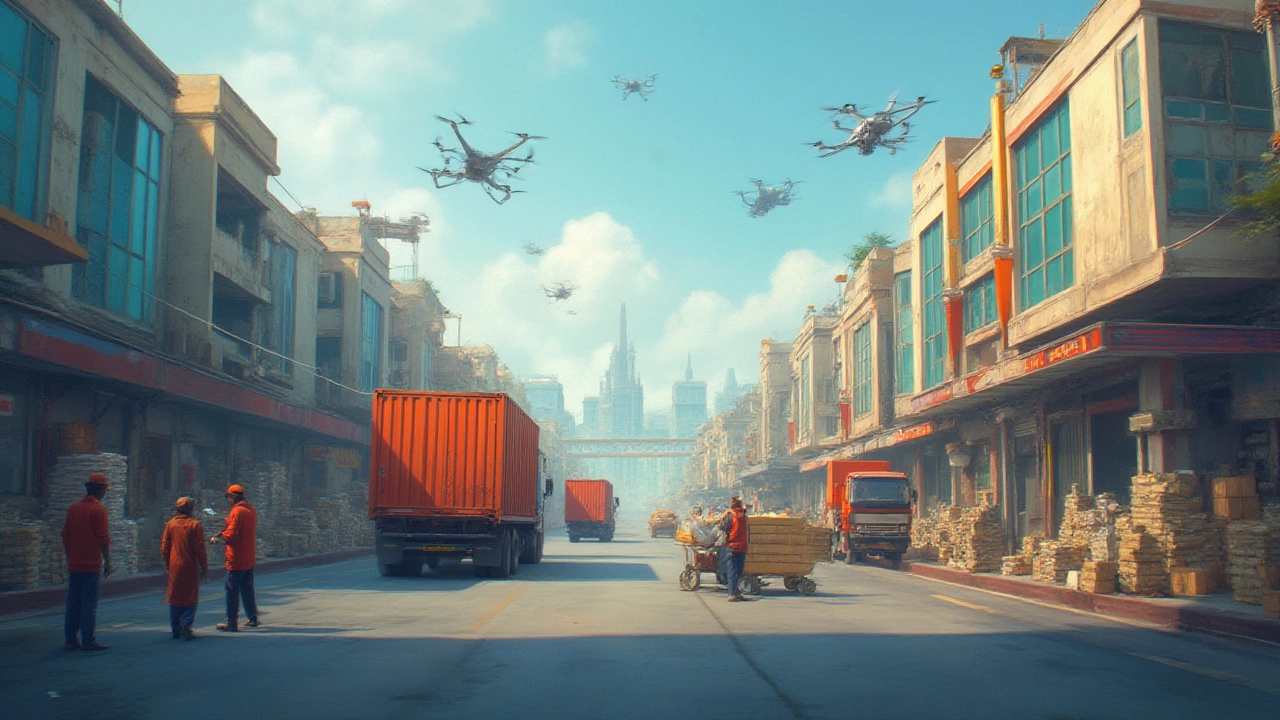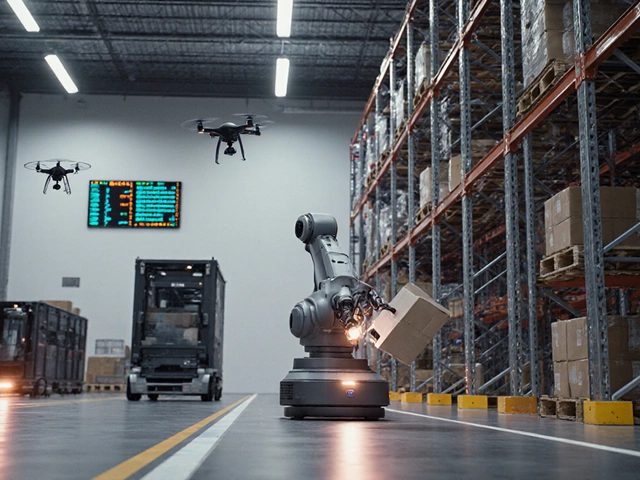Think your favorite online shop delivers fast? Imagine coordinating shipments for tens of thousands of companies daily, moving millions of parcels and cargo containers across tens of thousands of miles, right down to the last minute. The modern logistics world is built on a delicate balance of technology, experience, and relentless hustle. One minor hiccup, and shelves empty, production lines pause, and the clock on fresh food starts ticking. The real stars of this show are the logistics giants—companies so integrated that half the world’s products pass through their networks. But who tops the list?
What Exactly Makes a Logistics Company the ‘Top’ One?
Let’s be honest: 'top logistics company' can mean different things to different people. Some think it’s just about revenue. Others are obsessed with how fast they can ship a carton of bananas from Ecuador to Manchester. There’s also reach—can this company get your stuff anywhere, even the middle of nowhere? And then, there’s tech. Today, logistics is less about muscle and more about data, AI, warehouse robots, and clever route optimization. So, what makes one company stand above the rest?
First, let’s look at the big metrics: global presence, reliability, delivery speed, capacity for special cargo (perishables, hazardous goods, medical supplies), and investment in sustainable solutions. How do you even compare two companies with thousands of trucks, planes, ships, and drones? For companies trading on the international level, logistics isn’t just about moving stuff. It’s about visibility (tracking), collaboration (working with customs and partners), and resilience in times of disruption (like that time a single ship blocked the entire Suez Canal). It’s also about flexibility—pivoting quickly when a pandemic hits or a volcano explodes in Iceland.
Tech plays a titanic role too. The biggest players have been pouring billions into AI, blockchain for secure documentation, hyper-automated fulfillment centres, and carbon-neutral transport. Logistics experts today joke: 'We’re as much a software company as we are transport.' DHL, for example, spent over $2 billion since 2019 on digital transformations across their supply chain. Then there are companies leaning into sustainability, like Maersk planning carbon-neutral vessels or UPS investing in electric delivery fleets.
What about service range? Some giants handle end-to-end logistics, from picking up raw materials at one end of the world to delivering to the customer’s door. Others specialize in freight forwarding, warehousing, or cold-chain solutions. As the market keeps evolving, the ability to offer specialized solutions has become key. In 2023, Gartner reported the 'most admired' logistics companies consistently offered predictive analytics, real-time tracking visibility, and climate-focused supply chain options, while competitors lagged behind.
So, when we talk about the 'top' logistics company, we’re looking for a blend: reach, technology, reliability, speed, service variety, sustainable improvement, and adaptability. Size alone doesn’t win anymore—agility and innovation do.
Who are the Big Names—and What Sets the Leader Apart?
Scroll any list ranking global logistics companies, and a few names keep popping up: DHL, UPS, FedEx, Maersk, DB Schenker, Kuehne+Nagel, and DSV. But let’s zoom in on the one that most industry insiders quietly nod to: DHL. Why? Their yellow and red branding may look almost cartoonish, but over five decades, they’ve built a network that reaches over 220 countries and territories. They've mastered package deliveries, e-commerce fulfillment, medical supply chains, cross-border freight, and wild, high-risk projects (like getting urgent medical aid into war zones).
DHL’s parent company, Deutsche Post DHL Group, reported €94.4 billion in revenue in 2024, dwarfing close rivals. But it’s not just money—they’re ahead in tech, rolling out AI-driven supply chain tools, digital customer dashboards, and a fleet of environmentally-friendly vehicles. In the spring of 2024, they completed a pilot for fully autonomous drone delivery between Rotterdam and London, cutting some supply chain lead times by 30% on select routes. That’s not science fiction. It’s happening now.
UPS and FedEx do hold serious market power, especially for package and express deliveries. Maersk still dominates container shipping; their vessels are bigger than some UK towns. Meanwhile, Kuehne+Nagel and DSV are the go-to players for mega-scale freight forwarding. These companies invest vast sums in digitization and resilience against disruptions—Kuehne+Nagel, for instance, pioneered port digital twin technology, which helps reroute shipments instantly if something blocks a port.
The world’s top logistics firms battle to attract talent, invest in next-level data analytics, and race for green supply chain solutions. DHL’s GoGreen Plus program is slashing emissions—by the end of 2025, they’ve promised to electrify at least 80% of their delivery fleet in Europe. UPS, not to be outdone, committed to 100,000 electric vehicles in North America and Europe. The arms race isn’t just about speed—it’s about being future-proof.
But no one is perfect. The industry faces constant pressure from labor shortages, cyberattacks, extreme weather, and political shifts. In 2024, a major ransomware attack disrupted DB Schenker’s European network for two weeks, underlining the need for strong digital security. Still, the race isn’t just for today’s market. It’s about who can anticipate tomorrow’s challenges and lead the transformation. As Gartner’s 2023 Magic Quadrant study highlighted, 'The real leader is not just the biggest, but the one innovating ahead of the market curve.'

The Secret Sauce: How Top Logistics Companies Connect the World
If you think the logistics industry is just about trucks and warehouses, think again. The best companies are the nerve centers for the world’s biggest brands. From Apple’s product launches to COVID vaccine rollouts and the rescue of Christmas retail in 2021, logistics partners are the invisible hands making it all work. But what’s their secret sauce?
Data is king. Modern logistics giants run on real-time analytics that map every link in the supply chain, predict hiccups before they happen, and correct course in hours, not days. In DHL’s Singapore innovation center, shelves and pallets talk to each other using sensors, creating a live feed of inventory levels and order progress. UPS has ORION, an AI-powered route optimization tool, which reportedly saves them more than 15 million miles of travel every year—cutting costs and slashing emissions. These systems aren’t just numbers—they change how quickly your online orders arrive and how reliably factories stay stocked.
Collaboration is another power move. Top providers team up with airlines, shipping lines, rail operators, and tech firms. During the global chip shortage in 2022, Maersk and DB Schenker joined forces to move critical electronics via non-traditional routes (including air-and-rail hybrids across Eurasia), keeping manufacturers alive. The best logistics companies build deep partnerships with customs agencies to speed up border crossings—DHL piloted electronic customs clearances in Kenya, clearing average wait times from four days to four hours.
Not every problem is solved with algorithms, though. When Switzerland’s rail tunnels flooded in late 2023, Kuehne+Nagel scrambled their emergency response team to reroute vital temperature-sensitive pharmaceuticals through Italy by road, collaborating with local authorities in real-time. It’s the human factor, the 24/7 responsiveness, that sets leaders apart in crisis. Quoting from a Reuters feature in October 2024:
“The resilience shown by top logistics firms in adversity is a product of strong planning, nimble teams, and intelligent use of emerging technologies.”
What about sustainability? Top players like Maersk have invested hundreds of millions in methanol-powered ships and biofuel options. DHL and UPS push hard on electric vehicles, solar-powered warehouses, and bulk zero-carbon shipping options. In the era of net-zero pledges, customers demand more than speed—they want the assurance their goods aren’t torching the planet.
So, if there’s a golden formula, it’s the ability to mesh advanced technology, sharp risk management, relentless problem-solving, and planet-friendly innovation. Companies pulling ahead do all these things, every day, at scale.
How to Choose the Right Logistics Company for Your Needs
Say you’re running a business, big or small, or even launching a project that needs to get parts from China to Bristol by next weekend. How do you pick the logistics partner that won’t let you down?
First question: what exactly do you need moved, and where? Are we talking parcels, containers, hazardous chemicals, food, or high-value medical equipment? Some logistics companies shine in e-commerce deliveries (FedEx, DHL), while others are specialists in big industrial shipments or sensitive cargo (think DB Schenker or Maersk).
Speed and transparency matter too. Does the company offer live tracking and proactive updates if something goes sideways? The top players have slick dashboards now—some even send live ETA updates through WhatsApp. If you’re exporting goods and want to deal with the fewest customs headaches, ask if the company offers integrated customs brokerage or trade compliance consultation.
Sustainability is on everyone’s mind. If you’re building a green brand, you want a partner with public climate goals or, better yet, a carbon-neutral shipping option. DHL and UPS each offer such programs, allowing you to offset your shipment’s emissions or even choose green transport. Ask for real documentation to verify these claims—reputable providers will have carbon reports and case studies they’re happy to show.
Tech support matters if you have an online shop or digital business. Can the company’s systems plug straight into your software for seamless order processing? Top providers have API integrations with Shopify, Magento, and even bespoke solutions for complicated inventories. If you’re handling temperature-sensitive pharmaceuticals, look for cold-chain certifications and proven service history.
Don’t forget about customer service. Fast delivery means nothing if you’re stuck on hold for hours during a crisis. Best-in-class logistics partners offer 24/7 support, dedicated account reps, and lose-the-jargon communication. Look for awards, real customer testimonials, and media reviews, not just glitzy websites.
- Clarify exactly what services you’ll need—shipping type, insurance, storage, customs, returns
- Check company network for destination and regulatory know-how
- Push for technology and tracking capabilities
- Review sustainability credentials and request real impact reports
- Request case studies or referrals with similar cargo and destinations
- Look for transparent pricing with no mysterious surcharges
- Test customer support responsiveness before you commit
The logistics landscape shifts fast as new challenges—and new tech—emerge. The top logistics company for your needs will be the one blending global reach, proven expertise, trustworthy tech, and strong human service, all while keeping climate impact on their radar. Don’t just follow this year’s headlines—look for the partner ready to innovate alongside you, whatever comes next.





